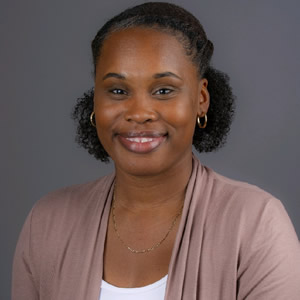Creating change from the inside out
Tamekia Scott, EdD, has joined the School of Communication to lead our acccess, accountability, and outreach efforts. Dean E. Patrick Johnson created this position to ensure that the school’s excellence and success are rooted in institutional change and individual investment from the inside out.

Tell us about your start in life.
I grew up in Aurora, Illinois, near Naperville. In many of my classrooms I was the only person of color, a very interesting dynamic for my work now. All of my primary education was in spaces where I was the “only.” I learned a lot.
I attended Southern Illinois University in Carbondale for my bachelor’s degree because I wanted to be a dentist. But I realized I hated needles, so I shifted my interests to psychology, especially the counseling side, and got even more interested in identity as it relates to how we move about in the world.
I completed my master’s at SIU and found the love of my life. After we got married and moved back north, I got into higher education, which I loved. I decided to focus on the student perspective, to make sure that more folks who look like me and had experiences like me would have access to good opportunities.
I am a first-generation college student. Navigating that space was hard, and so I wanted to open the doors for others. Then I realized that I really needed to get to the policy level, which I could only foresee doing by getting a doctorate, which I did. But it turns out I felt I could be more effective and efficient in a consulting role. So I opened my own consulting business and had been doing that work for the last five years.
But I missed higher education. I wanted to come back. I love the space—I love the environment.
Why is access and accountability work meaningful to you?
It speaks directly to my own journey. In higher ed, whether as a staff member or faculty, I’ve always felt there’s a sense of community. Doing the work in and as a community is what is so rewarding. We are designed to be an institution or community of higher learning, so ensuring collective access should be easy.
We’ve seen an intense backlash to DEI policies, especially among politicians. What do you think is most misunderstood about it?
I just read an article on how a company did a broad-strokes research survey on the cost of DEI efforts and how universities have spent millions of dollars on DEI. And in reading some of the details, my first question was: how did you define diversity, equity, and inclusion? And for the positions that you had established, who was doing the work? Was it your chief diversity officer? Was it the stakeholders? There’s an assumption about DEI based on what individuals perceive or believe to be a truth—and that’s probably not a truth. It’s simply because people have been misinformed or aren’t interested in really doing the work that’s required to understand what DEI truly is—namely, a value to folks in every walk of life. To me, DEI is rooted in access—who has access? It’s not about a race or gender or a particular identity. It’s about a collective group being intentional about moving forward—plans and processes and procedures that really address access for all.
How do you see the School of Communication fully embracing this work? What does that look like for our community?
What it would look like is having continuous, sustained conversations around access, accountability, and outreach based on a common understanding. And from that understanding we’d develop policies and procedures that center these tenets. The work is easy, but personalities can make it difficult.
How would you want to see this community change, evolve, and grow?
I’m always excited about the work, but the excitement typically dwindles when I see that we’re not moving. And not moving could be because we just can’t move or we’re not willing to move. So that’s the question in the back of my head: are we going to move? And if so, what will that movement look like? I like being able to direct that movement, and it’s exciting to know that no one has held this position within the school before. All the people I’ve talked to here seem extremely enthusiastic about how we could work together to actually get things moving, and that’s exciting.
